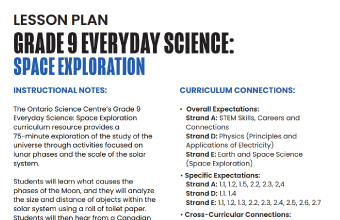Space Exploration
Curriculum Connections
Strand A : STEM Skills, Careers, and Connections
| A1.1 | apply a scientific research process and associated skills to conduct investigations, making connections between their research and the scientific concepts they are learning |
|---|---|
| A1.2 | apply a scientific experimentation process and associated skills to conduct investigations, making connections between their observations and findings and the scientific concepts they are learning |
| A1.5 | apply their knowledge and understanding of safe practices and procedures, including the Workplace Hazardous Materials Information System (WHMIS), while planning and carrying out hands-on investigations |
| A2.2 | describe how scientific innovations and emerging technologies, including artificial intelligence systems, impact society and careers |
| A2.3 | analyse how the development and application of science is economically, culturally, and socially contextualized, by investigating real-world issues |
| A2.4 | apply scientific literacy skills when investigating social and environmental issues that have personal, local, and/or global impacts |
Strand D : Physics
| D1.1 | assess social, environmental, and economic benefits and challenges resulting from the production of electrical energy from various sources |
|---|---|
| D1.4 | analyse social, environmental, and economic impacts of emerging technologies related to electrical energy production, consumption, storage, and conservation |
Strand E : Earth and Space Science
| E1.1 | evaluate social, environmental, and economic impacts of space observation and exploration |
|---|---|
| E1.2 | evaluate how space observation and exploration technologies contribute to our understanding of climate change, natural disasters, and other phenomena |
| E1.3 | assess ways in which technological innovations related to space observation and exploration are applied in various fields, including their contributions to sustainable practices on Earth |
| E2.2 | explain how the Sun’s energy causes natural phenomena on Earth, and how these phenomena contribute to renewable energy production |
| E2.3 | summarize observational evidence used to support theories about the origin and evolution of the universe and the solar system, considering diverse ways of knowing |
| E2.4 | describe major components of the solar system and the universe and compare their characteristics |
| E2.5 | quantify distances in the solar system and the universe by applying an understanding of relative distances and sizes and using appropriate units of measure |
| E2.6 | conduct investigations to explain the causes of various astronomical phenomena that can be observed from Earth |
